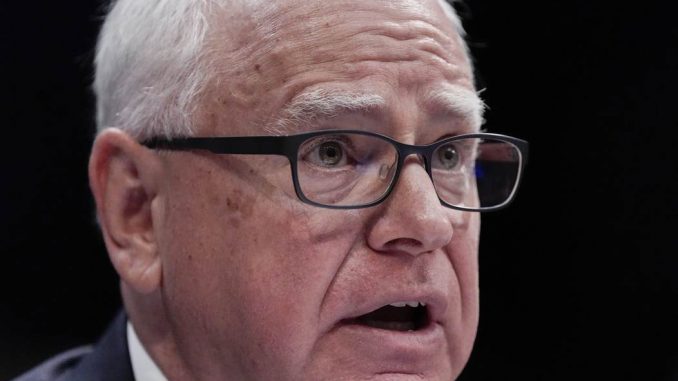
Tim Walz/AP Photo/Julia Demaree Nikhinson
| Published June 21, 2025
The media landscape lit up briefly this past week when details emerged about Vance Luther Boelter, the suspect in the Minnesota political assassination plot. But just as quickly as the headlines arrived, they vanished — and with them, a chilling confession letter that should have ignited serious debate.
So why did this story disappear?
The answer is uncomfortably simple: the facts didn’t fit the narrative.
📄 A Letter That Disrupted the Script
Boelter’s handwritten confession, reportedly delivered to the FBI and later uncovered in his vehicle, named Minnesota Governor Tim Walz — a Democrat — as the person who ordered him to assassinate Senator Amy Klobuchar. The claim was not only bizarre and unsubstantiated but described as “incoherent” by authorities. Still, in a news cycle that thrives on the political weaponization of violence, such a revelation should have stirred far more media attention.
Instead, it was swept away.
🧠 When Mental Illness Upends Political Framing
Initial media buzz implied the attacker may have been part of a growing wave of radicalized far-right extremists. But the release of Boelter’s letter shattered that line of thinking. Rather than fitting neatly into a “domestic terrorist” profile aligned with conservative politics, the assassin appeared mentally unstable — consumed by personal delusions and obsessed with Democratic leadership.
In short: he didn’t fit the narrative.
So the national media, which had just begun to circle the story, quietly stepped back.
🧏♂️ A Deafening Silence
Conservative outlets like RedState and PJ Media called out the vanishing act. “That’s why this was out of the news by Tuesday,” one noted, pointing to how coverage collapsed once the letter implicated a Democrat. Some readers rightly asked: had Boelter claimed a Republican governor or Donald Trump gave him orders, would the media have reacted differently?
The question answers itself.
🧭 What It Reveals About Newsrooms
The Boelter case is more than just an odd footnote. It exposes a growing tendency within major media institutions to filter stories through the lens of political convenience. When facts align, coverage expands. When they conflict, it contracts. This selective storytelling erodes public trust — and in moments like this, it’s impossible not to notice.
Boelter’s letter was unhinged. But the story it told about the media might be even more disturbing.
🔚 Overall Analysis: When Silence Speaks Louder Than the Story
The rapid disappearance of the Minnesota assassination plot from mainstream headlines reveals a troubling truth about today’s media ecosystem: news isn’t always guided by importance — it’s often shaped by ideological usefulness.
Boelter’s letter, bizarre and incoherent as it may have been, implicated a sitting Democratic governor in an alleged plot to assassinate a U.S. senator. Even if authorities dismissed the claim as the product of a disturbed mind, such a development warranted further national scrutiny, deeper investigative reporting, and public conversation. After all, mental instability doesn’t absolve the system from asking how an individual could come to believe — or claim — that a political figure ordered a hit on another.
Yet rather than exploring the potential implications, inconsistencies, or broader warning signs, most outlets pivoted away the moment the storyline no longer aligned with an expected narrative. If Boelter had blamed a conservative figure, the public can reasonably assume the coverage would have escalated, not evaporated. Instead, the moment his accusations pointed leftward, interest dwindled. The headlines dried up. And the cameras moved on.
This kind of editorial selectivity erodes more than just trust in journalism — it deepens the perception that the press functions not as a neutral observer, but as a filter through which reality is pre-approved. The public sees this pattern. They sense the silence. And they know, instinctively, when they’re being asked to forget something that should have been remembered.
Democracy depends on a press that is brave enough to follow stories wherever they lead — not just when they serve a preferred political lens. The Boelter case, in its strange and tragic complexity, deserved to be followed to the end. Instead, it was buried in the middle.
And that, perhaps, is the story that should worry us most.





Be the first to comment